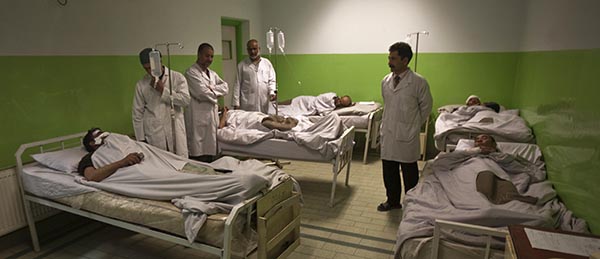KABUL - Minister of Public Health Firozuddin Feroz on Monday mapped out his 100-Day Plan and assured the country that his ministry was committed to improving and standardizing health services in the country.
He said his main priority was to ensure equal distribution of health services around the country and that he has plans in place to start building much needed hospitals in provinces.
Afghanistan's health status is one of the worst in the world and after decades of neglect, underfunding and war, the sector needs to recover.
According to the World Health Organization (WHO), by 2001, the health system was characterized by inadequate infrastructures with dilapidated facilities unevenly distributed across the country; impaired access to health services due to difficult communications and poor security; chronic shortage of skilled health providers (especially female); poor information systems; and weak implementation of the newly approved national health policy.
This resulted in inefficient coverage and health services delivery, and NGOs working to some extent independently from national structures.
But in his 100-Day Plan, Feroz is looking to close these gaps. He thanked the private sector and NGOs for working closely with his ministry and said to date, with their help, emergency services had already been established at 14 hospitals in Kabul.
He also said that discussions were underway to send local doctors abroad for advanced training.
However, he also raised the issue of polio in Afghanistan and said he was committed to eliminating the virus by 2018. He said the spread of polio was particularly bad along the Afghan-Pakistan border but that he had discussed the matter with Pakistani officials. Feroz however assured the nation that everything was being done to eliminate the virus all together.
He also said that his ministry had held talks with Pakistan and India on the issue of Afghans seeking medical treatment in the respective countries. He said Afghans were being forced to spend large sums of money when seeking specialized health care and said he had asked the two countries to help assist Afghans where possible.
In line with this he thanked the Afghan embassy in Delhi for everything it has done in this regard and for working closely with the ministry on matters relating to Afghans in India.
Feroz went on to say his policy is to support the private health sector in Afghanistan, which he says cooperates with his ministry. He stated that most private hospitals offered a good service although there were some that were below standard.
On these below-par institutions, action has been taken, he said.
According to him, there are about 100 clinics and hospitals in Kabul. "We need only 10 good hospitals which can provide good facilities," he said.
Feroz said that 10 such hospitals would ensure Afghans were not forced to leave the country in search of good medical facilities.
On the issue of pharmaceuticals being imported into the country, Feroz said that already some companies had lost their licenses after they were found to be importing sub-standard medicines.
Feroz said that as a result, the entire framework of importing pharmaceuticals into Afghanistan was under review.
The minister also mentioned the issue of security and said health services were not being provided in some provinces due to insecurity.
He said that health officials had also fallen victim to fighting in the provinces and that some had even been killed.
On this issue of budgets, Feroz said less money was now available than in the past. He said reforms and commitment to fighting corruption within the ministry was critical in order to receive much needed donor funding.
In conclusion, Feroz said that some government hospitals that had been closed in the past would be reopened over the next three months.
Last month, Feroz took decisive action and closed down nine private clinics in Kabul over what the ministry claimed was sub-standard facilities.
He said at the time that in the three weeks leading up to the closures, the ministry reviewed operating conditions of 54 private hospitals and clinics in the city. Of the 54, only 21 hospitals were providing services that met government's criteria. The remaining 24 were given three months to standardize their services, or their licenses would be revoked.
In reviewing the hospitals, officials looked at the premises, operating theatres, medical equipment, diagnostic services and the level of professionalism among employees.
Hospitals that lost their licenses were Ali Seena in Kart-e-Se, Spin Ghar in Kot-e-Sangi, Madawa on Company Street, Shamsul Rahman Tora Ki in Kart-e-Naw, Karimul Rahman in Khair Khana, Khurami in Khair Khan, Elaj in Khair Khana, Gulab Ahmadzai in Arzan Qeemat and Faisal on Sarsabzi Street.
Feroz said: "We will continue our review of private hospitals. We are forced to act seriously against them and more hospitals will be closed if the standards are not maintained." (Tolonews)

